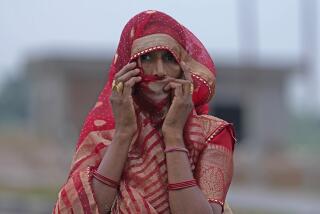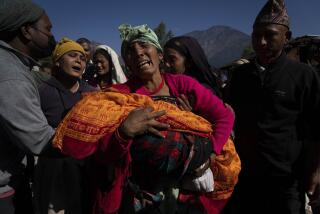Bombs Kill 8 at Rites for ‘Frontier Gandhi’
- Share via
JALALABAD, Afghanistan — At least eight people were killed here Friday at the funeral of an internationally known tribal leader when bombs exploded among vehicles of the mourners, including the Afghan leader, Najibullah, and the vice president of India.
Scores were injured and some reports said as many as 18 were killed by the bombs, set on buses that had helped carry thousands from Pakistan to this city in eastern Afghanistan for the funeral of Khan Abdul Ghaffar Khan.
Ghaffar Khan, who died Wednesday at age 98 in Peshawar, Pakistan, his native region, was venerated by ethnic Pushtuns and many others in Pakistan, India and Afghanistan for his lifelong battles against British colonialism and for a Pushtun state.
One of the blasts turned five buses into heaps of twisted metal and badly damaged a score of other vehicles. A number of other vehicles were damaged at the second site, several hundred yards away.
Afghan officials immediately blamed the Afghan guerrillas, or moujahedeen, who are fighting the government and the Soviet forces supporting it. Guerrilla leaders said from their headquarters in Peshawar that they were not involved.
Ghaffar Khan allied himself with Mohandas K. (Mahatma) Gandhi during the Indian struggle for independence from Britain, and was dubbed the “Frontier Gandhi.” When the British colony divided into India and Pakistan at independence in 1947, Ghaffar Khan fought for an autonomous Pushtun homeland that would join the tribal group’s traditional lands in Afghanistan and Pakistan.
Because of his fight for a Pushtun homeland, successive Pakistani governments imprisoned him, leading him to live in self-imposed exile in Jalalabad for several years in the 1960s and 1970s. He asked to be buried here.
There was no sign of the violence to come early Friday morning. The long motorcade followed a large red truck carrying Ghaffar Khan’s body over the Khyber Pass and through border checkpoints into Afghanistan.
Reminders of War
Once in Afghanistan, however, there were quick reminders of the eight-year guerrilla war against the Soviet-backed government. The roadway, badly damaged in places, was guarded by tanks and artillery dug into roadside emplacements and facing outward toward snow-capped mountains from which the moujahedeen normally attack.
While the roadways into Jalalabad showed marks of war, the city itself seemed relatively unscathed and there were signs of cultivation in nearby fields.
In his speech, Afghan President Najibullah said Ghaffar Khan had labeled the resistance movement “anti-revolutionaries” and he appealed for “unity of the Afghan and Pushtun peoples,” saying this, too, was a goal of the Pushtun leader.
Indian Vice President Shankar Dayal Sharma recalled Ghaffar Khan’s long-term links with India. Indian Prime Minister Rajiv Gandhi had visited Peshawar on Wednesday to pay his respects, as did Pakistani President Zia ul-Haq on Thursday.
More to Read
Sign up for Essential California
The most important California stories and recommendations in your inbox every morning.
You may occasionally receive promotional content from the Los Angeles Times.













